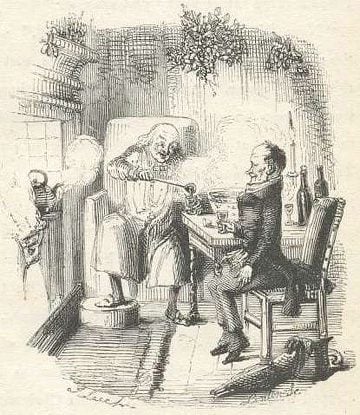Keeping Christmas Well…Like Ebenezer Scrooge
She gave birth to her first child, a son. She wrapped him snugly in strips of cloth and laid him in a manger, because there was no lodging available for them.

In the first stave of Charles Dickens’ classic story, A Christmas Carol, Ebenezer Scrooge didn’t have much enthusiasm for Christmas. “If I could work my will,” said Scrooge indignantly, “every idiot who goes about with ‘Merry Christmas’ on his lips should be boiled with his own pudding, and buried with a stake of holly through his heart.” But, after being visited by the ghost of his former partner, Jacob Marley, and the three spirits of Christmas, Scrooge is a changed man. To the Ghost of Christmas Future, he promises, “I will honour Christmas in my heart, and try to keep it all the year.” Indeed, he did. The final paragraphs of A Christmas Carol report that Scrooge “knew how to keep Christmas well, if any man alive possessed the knowledge.” To this Dickens adds, “May that be truly said of us, and all of us!”
What would it be like to keep Christmas well? For Ebenezer Scrooge, this was primarily a matter of generosity, joyfulness, fairness in the workplace, and care for people in need. Scrooge “became as good a friend, as good a master, and as good a man as the good old City knew, or any other good old city, town, or borough in the good old world.” But, as praiseworthy as these behaviors and characteristics might be, I wonder: Is that all there is to keeping Christmas well? Or might there be more? And if there is more, how would we know what keeping Christmas well really means?
If we’re going to answer these questions, we must remember the essential event of Christmas: the birth of Jesus, who was wrapped in swaddling clothes and laid in a manger, because there was no room for him and his parents at the inn. Yet, this seemingly insignificant event was, in fact, the watershed event of history, the entrance of the Word of God into human life as human flesh. Keeping Christmas well means paying close attention, not only to what happened at Christmas, but especially to its meaning. In truth, Christmas changes everything, including how you and I might live each day.
In the eleven days to come, I will be reflecting on what it means to keep Christmas well by focusing on the implications of the birth of Jesus for our lives. Thus, the whole season of Christmas, all twelve days, including today, will be a time for us to consider how we might honor Christmas each day, not only in our hearts, but also in daily activities: in our work, in our relationships, in our service to others, in our finances. I invite you to join me in the adventure of discovering how we might keep Christmas well.
QUESTIONS FOR FURTHER REFLECTION: When you hear the phrase “keeping Christmas well,” what comes to mind? How might you keep Christmas well even today, Christmas day?
PRAYER:
Joy to the world, the Lord is come!
Let earth receive her King;
Let every heart prepare Him room,
And Heaven and nature sing,
And Heaven and nature sing,
And Heaven, and Heaven, and nature sing.
Joy to the earth, the Savior reigns!
Let men their songs employ;
While fields and floods, rocks, hills and plains
Repeat the sounding joy,
Repeat the sounding joy,
Repeat, repeat, the sounding joy.
No more let sins and sorrows grow,
Nor thorns infest the ground;
He comes to make His blessings flow
Far as the curse is found,
Far as the curse is found,
Far as, far as, the curse is found.
He rules the world with truth and grace,
And makes the nations prove
The glories of His righteousness,
And wonders of His love,
And wonders of His love,
And wonders, wonders, of His love.
Amen.
“Joy to the World” was written as a Christian reflection on Psalm 98 by Isaac Watts. First published in 1719.











